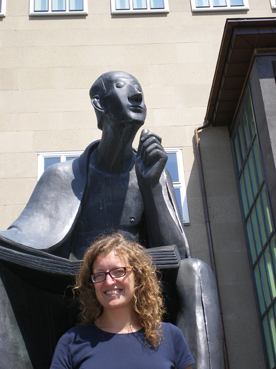
General Linguistics
Department of Linguistics
D-50923 Cologne
Tel: +49-221-470-6328
Fax: +49-221-470-5947
E-Mail: sonja.gipper[at]uni-koeln[dot]de
Sonja Gipper is a postdoctoral researcher in the project Language Challenges within the Key Profile Area Skills and Structures in Language and Cognition (SSLAC). Within this project, she participates in various research projects, among them:
- the multimodal design of feedback signals in signed and spoken languages
- the interactional conditioning of the use of elliptical structures in German
- forms and functions of feedback signals across languages
For her talk at the 18th International Pragmatics Conference in Brussels (2023) on the distribution of information in request for reconfirmation sequences in Yurakaré (isolate, Bolivia), she was awarded one of the two “IPrA’s Pragmatics of an Understudied Language Awards”.
Having a strong interest in cross-linguistic similarities and differences regarding patterns of language use in interaction, Sonja Gipper is a member of two networks carrying out cross-linguistic research based on spoken language corpora. The SCOPIC project headed by Nicholas Evans and Danielle Barth has the objective of creating parallax corpora using the same stimulus materials in order to enable cross-linguistic comparative corpus research. In one of our publications from this project, we use these corpora to assess the contributions of language vs. individuals to variability in usage patterns. The DFG-funded Scientific Network Interactional Linguistics led by Martin Pfeiffer and Katharina König has the objective of investigating the cross-linguistic structuring of interaction using the example of request for confirmation sequences. In a recent publication from this project, Sonja Gipper, Katharina König and Kathrin Weber show that requests for reconfirmation in Yurakaré are very different in form and function from those in German and Low German.
Together with Eugen Hill and Martin Becker, Sonja Gipper carried out the project Conversational Priming in Language Change that investigated the role of repetitional responses in linguistic transmission (2021-2022, funded by the Excellent Research Support Programme of the University of Cologne, format FORUM).
In her descriptive and documentary work, she focuses on Yurakaré, an endangered linguistic isolate spoken in the Andean foothill area of central Bolivia. Together with Yurakaré speaker Jeremías Ballivián, she has recently contributed data from Yurakaré to various Glottobank databases in a project funded by ELDP.
In collaboration with the Anthropologist Vincent Hirtzel (Laboratoire d’ethnologie et de sociologie comparative, CNRS Nanterre) she is currently investigating the experiences of the Yurakaré during the global Covid-19 pandemic using data from a project funded by the Global South Studies Center at the University of Cologne.
Moreover, in the project "Documenting theories and practices of language socialization in the context of endangerment: A pilot study on Yurakaré" funded by ELDP (Endangered Languages Programme), she is collaborating with Jeremías Ballivián Torrico from the Fundación de Apoyo a las Naciones Indígenas SAMMA (Cochabamba, Bolivia) in order to investigate how children still acquire passive knowledge of Yurakaré despite a break in the transmission of the language.
In a completed project funded by the DFG, Sonja Gipper investigated the manifestation of linguistic variation and language attitudes among speakers of Yurakaré. In one of the publications from this project, she shows how the current language shift among the Yurakaré toward Spanish is accompanied by a shift from a Yurakaré to a western ontology of language, where language is no longer conceptualized as pertaining to a person’s body but rather as an object external to its speakers.
From 2006 to 2011, she worked on a documentation project on Yurakaré as a doctoral student, which was funded by DobeS (Volkswagen Foundation) and located at the MPI for Psycholinguistics in Nijmegen. The documentation is accessible via the DobeS Archive. In her dissertation (2011, Radboud University Nijmegen) she examined how the evidentiality and intersubjectivity markers in Yurakaré are used in conversations.